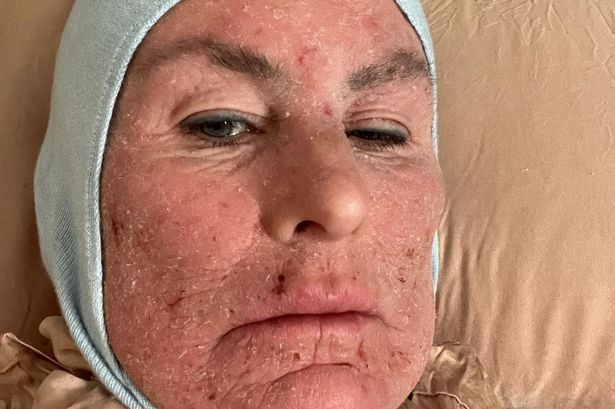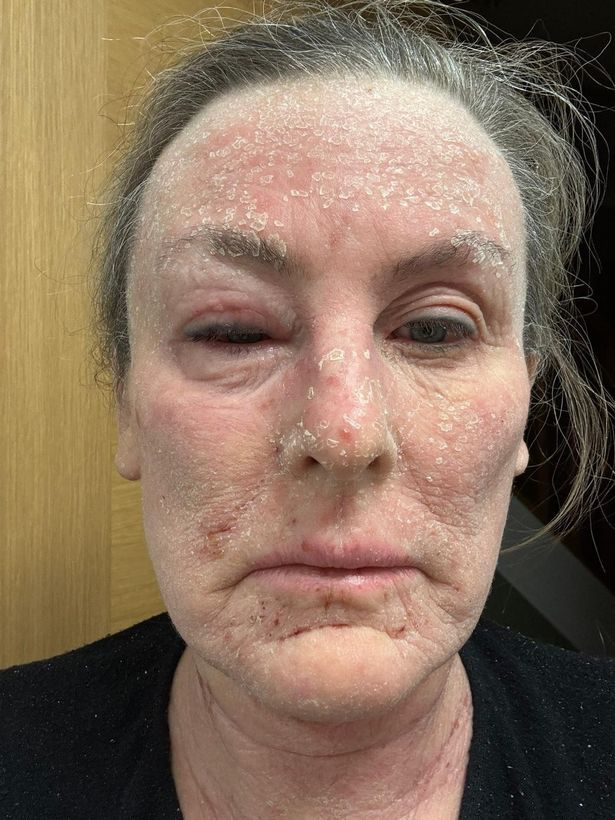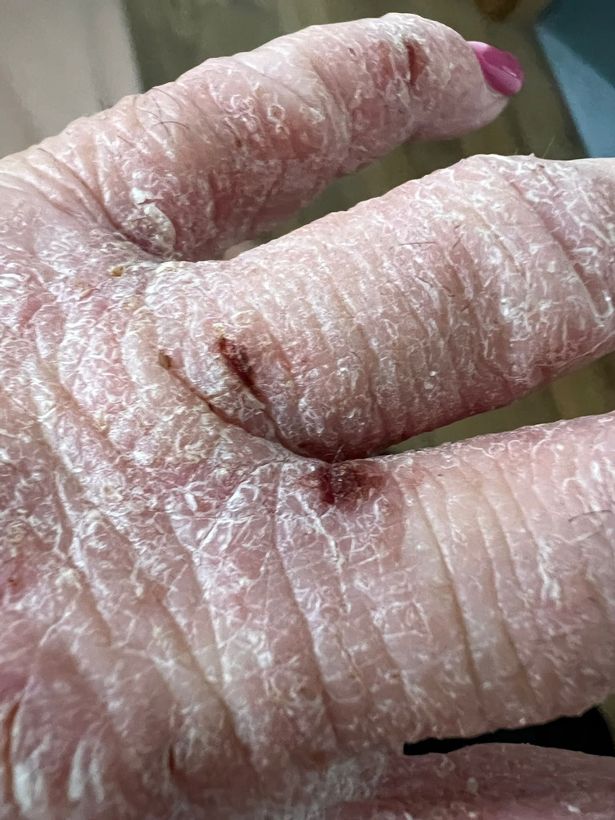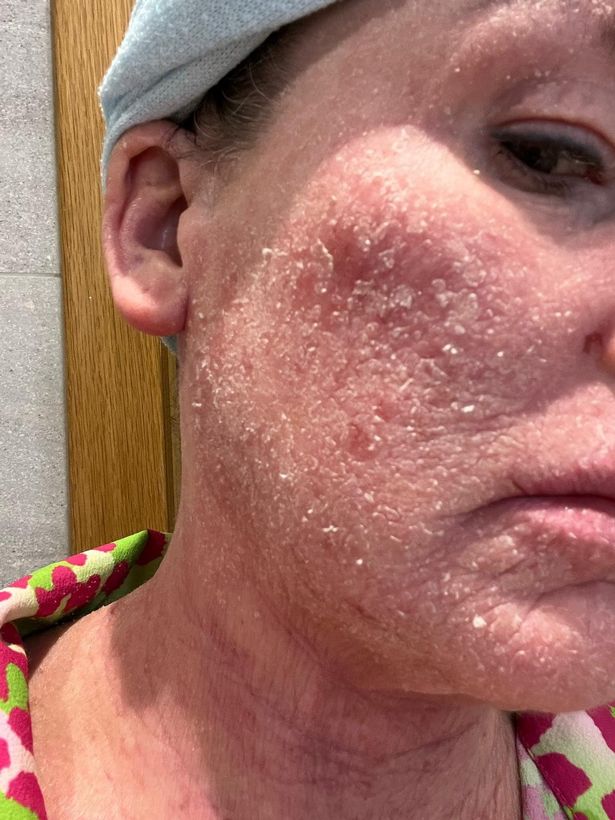“It has ruined my life in every way – I have had to give up my beauty business that I have built over 16 years ago and had to stop working three years ago.”
12:33, 28 May 2025Updated 12:37, 28 May 2025
 Karyn stopped using the creams three years ago. (Image: SWNS)
Karyn stopped using the creams three years ago. (Image: SWNS)
A Scots mum who has used steroid creams for 40 years said they have “ruined” her life – causing her skin to be crusty and in pain.
Karyn Flett, 54, has used topical steroids to control her eczema for most of her life, since she was 10 years old.
The mum from Thornton in Fife, has relied on repeat prescriptions to treat her condition but stopped using them three years ago, but has noticed her symptoms getting much worse.
Karyn says she now suffers from topical steroid withdrawal (TSW), which left her skin raw, oozing and cracked.
Despite receiving support from the NHS, Karyn feels dermatologists are not open for discussions related to TSW.
The mum said the visual aspect of her skin has given her PTSD and spent bed bound and house bound for three years due the “excruciating” pain.
 Karyn was left bed bound with the pain. (Image: SWNS)
Karyn was left bed bound with the pain. (Image: SWNS)
Karyn said: “It has affected my life in every way. My skin has always been an issue all through life.
“It has ruined my life in every way – I have had to give up my beauty business that I have built over 16 years ago and had to stop working three years ago.
“It is absolutely excruciatingly painful. The visual aspect of it has given me PTSD.
“I no longer even share a room with my husband anymore because it was triggering to have any body heat next to me.”
Topical steroids are used to treat a range of skin conditions and is one of the most prescribed medications used by GPs.
However, when prolonged use of steroids is stopped, some patients experience symptoms worse than their original condition, known as topical steroid withdrawal (TSW).
Karyn believes that the creams have given her steroid induced eczema and that has in fact been the cause of her eczema worsening through her adulthood.
The Fife mum said that people know how to use the creams however she claims that they “are not designed for long term use” and people are “using them as instructed by their dermatologist”.
She said: “I just basically had allergies – grass and pollen. I only had a small irritation patch that had come up so of course the first line was being given topical steroids.
“Throughout history, like it happens to nearly everyone, the steroid creams do not get to the route of the problem.
“The problem would have been better to have been treated naturally and just avoiding allergens and irritants and moistorising.”
 The Fife mum said her symptoms got worse after she stopped using the creams. (Image: SWNS)
The Fife mum said her symptoms got worse after she stopped using the creams. (Image: SWNS)
Karyn’s skin worsened and she had widespread burning, red sleeves and an increased allergic response.
When she applied her topic steroids her skin would burn and would start to go into a “frenzied itch”.
It was only when she realised it was red skins syndrome, also known as topical steroid addiction (TSA).
In August 2022 she stopped using the creams but she then quickly had to stop working as her health rapidly deteriorated.
“My body shut down within days,” Karyn said.
“I have spent nearly over a year being bed bound unable to move from bed. I have needed to be cared for.
“My husband has had to take time off work at times. My youngest is a nurse she was ready to move in with her boyfriend but delayed that a year so that she could care for me at home.”
Patients and doctors are increasingly calling for more research into the skin treatment.
 Karyn had been prescribed the creams since she was 10-years-old. (Image: SWNS)
Karyn had been prescribed the creams since she was 10-years-old. (Image: SWNS)
And Karyn says she believes that more people are suffering debilitating reactions that are far worse than their initial condition.
“Topical are definitely not safe – they have no safeguarding,” she added.
“I feel if I stopped my steroids maybe even ten years ago I think I still would have had a topical steroid withdrawal because I think I have been caused a skin condition by reapplying the creams.
“As soon as the creams are removed the body goes into breakdown and needs them again.”
Despite Karyn’s skin being better now due to the use of a strong immunosuppressant, often used for transplant or cancer patients, the medication can comes with tremendous side effects and therefore she will be out of it in the next months.
Karyn reiterates that TSW healing is not “linear” as it continues throughout months and years.
 Karyn says the creams ‘ruined her life.'(Image: SWNS)
Karyn says the creams ‘ruined her life.'(Image: SWNS)
She said: “I expect to maybe revert back to being unwell once I’m tapered off the immunosuppressant in July.
“I’m just having symptoms managed but the drug that I’m taking is severe with awful side effects that can come with it, hence I can’t stay on it. My dermatologist doesn’t let me.”
Karyn found a community of people suffering from similar symptoms on the social media platform, TikTok.
The mum said she receives messages from people all around the world with the same symptoms and struggles as her.
“There’s babies suffering from this and young people suffering from this,” she added.
 Join the Daily Record WhatsApp community!
Join the Daily Record WhatsApp community!
Get the latest news sent straight to your messages by joining our WhatsApp community today.
You’ll receive daily updates on breaking news as well as the top headlines across Scotland.
No one will be able to see who is signed up and no one can send messages except the Daily Record team.
All you have to do is click here if you’re on mobile, select ‘Join Community’ and you’re in!
If you’re on a desktop, simply scan the QR code above with your phone and click ‘Join Community’.
We also treat our community members to special offers, promotions, and adverts from us and our partners. If you don’t like our community, you can check out any time you like.
To leave our community click on the name at the top of your screen and choose ‘exit group’.
If you’re curious, you can read our Privacy Notice.
A new study by researchers at the National Institutes of Health (NIH) determined that dermatitis resulting from TSW is distinct from eczema and is caused by an excess of an essential chemical compound in the body – called nicotinamide adenine dinucleotide (NAD+), a form of vitamin B3.
Karyn hopes this new study brings some changes to the world of dermatology and that it is discussed in parliament.
According to the National Eczema Society topical steroids are recommended by the NHS for treating eczema flare-ups and have been used for over 70 years.
To follow Karyn’s journey on topical steroid withdrawal check her Instagram on flawless_by_karyn_f and TikTok on @kflett3
